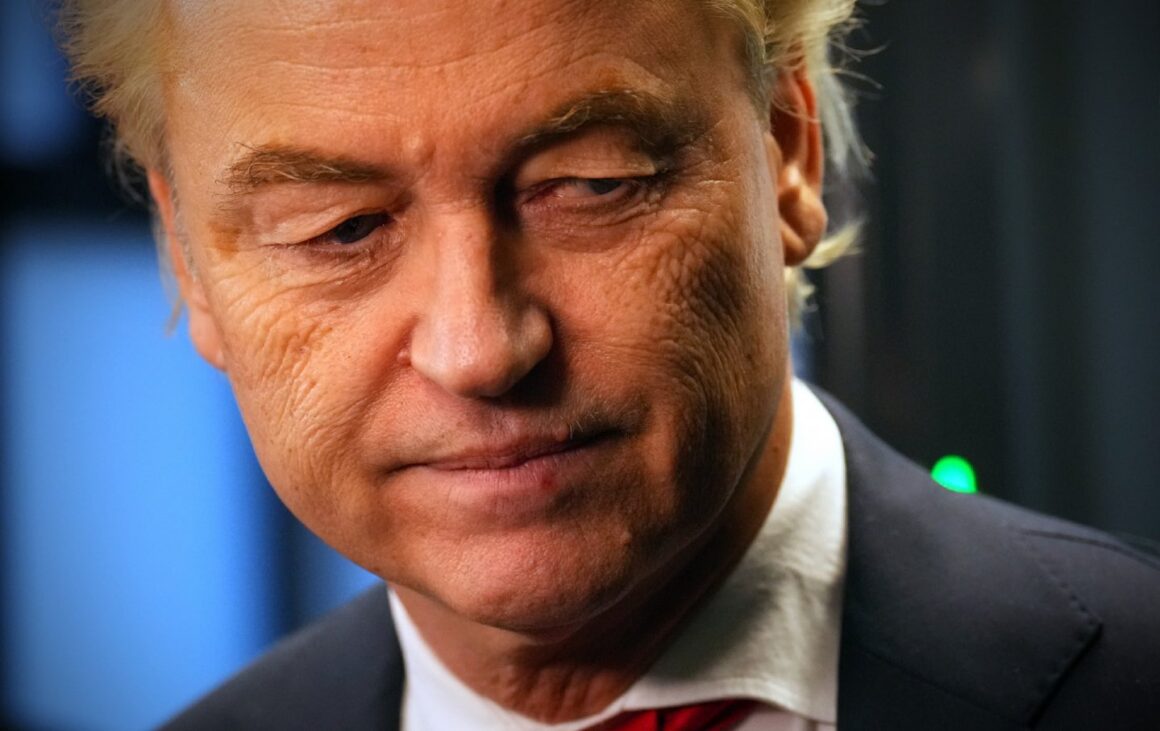By Pieter Brans, Socialistisch Alternatief (our sister organisation in Netherlands)
Wilders and his Freedom Party (PVV) have achieved a monster victory in the Dutch elections on November 22nd. Does this mean a shift to the right within society? No, rather a huge dissatisfaction with traditional politics, a lack of a left alternative and a clever game by Wilders to attract the anti-establishment vote.
On several occasions it has become clear that most workers and young people in the Netherlands are not right-wing. For example, a majority are in favor of increasing the minimum wage, for a millionaire’s tax, for the abolition of subsidies for fossil fuels, etc. Recently there was the largest climate march ever in the Netherlands. The only question is: who will pay for the climate transition? Ordinary working people certainly can’t afford it and Wilders took advantage of that.
There is also a lot of concern about migration. The world is going from one crisis and one war to another. Many people fear that they will have to pay for the misery in the world, that refugees will take away their homes, permanent jobs, etc. Wilders cleverly responded by linking social issues (lowering the state pension threshold to 65, an increase in the minimum wage, a higher rent allowance, etc.) to migration. In this way he pits different sections of the working class against each other. But what divides us weakens us in our fight against the real opponent: big business and its accomplices. It is the capitalist system that creates wars and crises. We fight for a world in which no one has to flee anymore. Until then, we should not let ourselves be carried away by populists who advocate an asylum freeze. There are enough resources in the Netherlands to give everyone enough, but they are concentrated in the hands of a small wealthy minority.
The central issue in all elections: will profits rise or will wages rise? And also: will the social expenditure of the capitalist state (education, healthcare, housing) increase? Or will there be an increase in state expenses that go to entrepreneurs (subsidies for large companies, tax benefits, etc.) and tax cuts for the rich? During the elections in the Netherlands, it was clear from the start that the right would win. The cause of this is simple.
The analysis: a low point in Dutch politics
There has been no mass workers’ party since the early 1990s. The working population, the working class, very diverse in composition but all dependent on labor to provide for their daily livelihood, does not have a broad party that represents their interests.
This means that elections will only be about which bourgeois party best represents the interests of the ruling class. Because the workers make up the vast majority of society, it is important which part of the working class no longer votes and which part is willing to give its vote to capitalist parties.
The political landscape is constantly changing. In the 1986 elections the Christian Democratic Appeal (CDA) was the party of big business and the People’s Party of Freedom and Democracy (VVD) the party of the smaller companies. In recent years, the VVD has been the most important party for entrepreneurs, large and small. The VVD governed with parties that supported capitalism, from the Labour Party (PvdA) and Green Lefts (GL) to the Christian Union and the PVV. In any case, government policies were rolled out that were good for profits and big business and bad for workers and social spending.
Over the past ten or thirteen years, a long series of crises has developed in capitalist society. There is the climate crisis, financial instability, costly and devastating wars, a crisis in healthcare and education and a serious housing shortage. Capitalism is in a phase of multi-crisis.
This has led to divisions among the ruling class — the bourgeoisie. Roughly speaking, two groups have emerged.
More far-sighted layers of the ruling class want to use alternative energy sources, produce more sustainably and maintain expenditure on education and healthcare, especially to maintain the geostrategic position of Dutch big business. Other wings of the (petty) bourgeoisie, whose profits are under more pressure, would prefer to return to the previous, neoliberal era, with as little state interference as possible. They want to continue making profits in the old-fashioned way, not spend money on other forms of energy. They prefer to solve the problems as much as possible within national borders. They want to get rid of multinational institutions such as the EU (which costs money) and in the US, federal institutions.
The bourgeoisie is divided and has no real alternatives. In many places it is losing control of the situation with all kinds of (right-wing) populists coming to power: Trump in the US, Bolsonaro in Brazil, Milei in Argentina, Orban in Hungary, Meloni in Italy etc.
Where does the working class stand on this? Due to the decline in wages over the past forty years and the decline in employment (low-paying jobs in the service sector instead of well-paid and secure jobs in industry), it has no money for additional expenditure on sustainability or more expensive (but better produced) food. In many countries, workers partly support the conservative wing of capitalism that does not want to spend money on climate and sustainability. It is the only chance workers see to avoid being left with (part of) the bill for the renewal of capitalism. That is the core of right-wing populism.
Over the course of this year, the VVD grew tired of all the compromises with parties that stand for a more progressive approach to capitalism, especially D66 (Democrats 66) . Breaking with them on the issue of migration, causing the fall of the government, as happened this summer, was an opening bid to rule the right.
The irony of the situation is that this might happen with the current election results, but not under the leadership of the VVD. Although it is not that easy to put together a new cabinet, it is clear that right-wing parties form a clear majority in parliament. The liberal capitalist parties, PvdA/GL and D66, are only a limited minority.
In recent times, Wilders has been portrayed as “moderate” in the media. That is the “moderation” of a wolf in sheep’s clothing. The PVV consistently stands up for the nationalism of the white blonde Christian Netherlands, wants a referendum on a Nexit and is anti everything that comes from outside, for the removal of climate measures, wants no more subsidies for culture and public broadcasting and bases itself in its program on the exclusion of population groups on the basis of religion and origin.
Even if the latter is temporarily put on hold for the purpose of coalition formation, it can be taken up again at any time. The capitalist state conceded to workers only limited rights, but the few rights that exist can be taken back if the need arises and if they’re not properly defended. The PVV is and remains not only a party that consciously creates a division into first and second class citizens, it is also a party without any form of party democracy (it has no members).
The SP (Socialist Party) suffered its 7th election defeat under Lillian Marijnissen. The party drops from 9 to 5 seats. The expulsion of the Red youth organization and many left-wing members has weakened the SP’s campaigning. Marijnissen’s positions: “the SP as a watchdog in a coalition” did not impress the voter. BIJ1 (a left anti-racist party that lacks a clear class programme and strategy) disappeared due to internal quarrels and the departure of Sylvana Simons from parliament. The Party for the Animals (focused on the environment and animal rights) torn by internal quarrels, lost half its seats. All in all, there is unfortunately very little left of the ‘small left parties’ in the House of Representatives. There will be virtually no critical voice in parliament in the coming period.
The formation: bluff poker rules!
We do not have a crystal ball to predict the outcome of the formation of a government, a ruling coalition as is customary in the Netherlands. But we can clarify how the participants in this incredible game of bluff poker relate to each other and what their problems are.
Due to the lack of a voice from the labor movement, the right dominates the social debate. But as the right grew bigger in the Netherlands, which has been going on for about 25 years, it also became increasingly divided. The fact is that in 2002 with the rise of the Pim Fortuyn List (LPF) and in 2010 there were great opportunities to really rule the Netherlands from the right. Those opportunities were seized, but turned out to be a flop on both occasions.
Now the opportunity is greater than ever to put a strong right-wing mark on the Netherlands. But just a few hours after the election results, the right-wing parties were already on the edge of the The Hague swamp. The VVD wanted to tolerate a right-wing cabinet, but did not want to participate.
All parties on the right suffer from problems that could ruin this opportunity for the right.
The PVV, the great political victor, in first place. Hopefully Wilders has a large refrigerator. Because the abolition of the deductible in healthcare, the significant increase in the minimum wage, lowering the retirement age to 65, lowering social rents, VAT on groceries to 0%, the dentist back in basic care (all good points by the way) will have to be completely or partially put on ice if he wants to govern with the VVD, New Social Contract (NSC) and Farmer-Citizen Movement (BBB).
A second problem is that the PVV does not have a number of experienced ministers, state secretaries and administrators. Wilders mainly allows yes-men in his party, not independent figures. There is also no support base (no members!) who can direct the party or feed it with ideas.
The NSC has twenty seats, but it also has problems. Its leader Omtzigt became popular because of his efforts to unravel the Benefits Scandal — the discovery that the Dutch state had falsely accused thousands of people of child benefit fraud (together with the SP, by the way). The benefits scandal was about government discrimination against citizens on racist grounds, remember?
The NSC has problems doing business with a party that is committed to discrimination against citizens because of their religion or background. According to polls, the NSC supporters appear to want to govern with the PVV and that is of course another problem. But whether Omtzigt wants a coalition with a party that has temporarily put the conflict between its program and the Constitution on hold is a big question.
Of all parties, the BBB seems to have the least problems with a new right-wing coalition. Its leader no longer needs participation in a government coalition: she can already block policies that cut nitrogen emissions (the main reason for the party’s formation) through the BBB majority in various provincial parliaments. For the BBB, government participation is an additional guarantee and an opportunity to reduce the influence of the EU.
Finally, the VVD. The VVD supporters want the right-wing coalition. That is difficult for the leadership of the VVD, who see new problems looming. After thirteen years of VVD dominance in the national government, its leader Yesilgüz would now have to play second fiddle. Participating in a cabinet with three partners who have no experience in national government is risky. A failure of the right-wing coalition would also reflect negatively on the VVD and that would come on top of its relative defeat.
Taking up PVV rhetoric to placate their voters is no problem for VVD ministers and parliamentarians. Being seen as the errand boys for Prime Minister Wilders and the PVV, while still being held accountable in the event of a failure in the elections is much less appealing to them.That is the VVD’s problem.
In summary: it will be difficult for these parties to agree on social policy, housing shortage and pension policy. They can agree on reducing immigration, but the fact that people with a migration background then automatically become less second class citizens leads to division. A referendum on a Dutch exit from the EU could also be very difficult; a yes vote would be extremely difficult to put into practice and provoke even more chaos than Brexit. Support for Ukraine could be a point of contention. And finally: even if such a cabinet is created, previous experiences indicate that such a cabinet can easily fall. It would be a cabinet of all kinds of parties, all willing to play tricks on each other as long as they stand to benefit.
Where does the Dutch labor movement stand?
Working people in the Netherlands have achieved a number of victories through action in the past period, especially on the wage front. That points the way forward.
Of course, many issues continue to require action from trade unions and other organisations. The increase in the minimum wage was ridiculously small, the reduction in the number of flights at Schiphol will have to be enforced through action, the climate problem requires tons of demonstrations and tough actions. Wars also demand attention: stopping the transit of weapons to Israel/Palestine requires action. The same applies to the housing shortage: housing associations will have to get back to doing what they were founded for.
It is especially important not to harbor illusions in the so-called “progressive wing” of the bourgeoisie, the entrepreneurs who strive for a more environmentally friendly and sustainable capitalist production. Of course that is better than production based on fossil fuels. Of course, some improvements can also be made within capitalism. But it remains production that is based on the exploitation of nature and labor power. None of the existing parties are going to do anything about this.
What can the Dutch labor movement and socialists in the Netherlands do in this situation? The FNV trade union federation has rightly come out to say that it will defend the constitutional rights of all its members. This needs to be broadened to a defense of their shared interests. For example, through a vigorous fight for automatic price compensation and higher wages. Taking to the streets against growing poverty and housing shortage. And make as much progress as possible in other areas, such as working conditions and work contracts, building on the actions that have recently been taken. And step up the fight for a minimum wage of 16 euros. This affects benefits as well. The most important thing is that action for this becomes more intensive.
It is the best way to face a period of a right-wing government. There is nothing new about such a cabinet. Strategic and symbolic concessions are possible, but the bill for the crisis will once again be presented to the working class. The labor movement should not expect any gifts. What is certain is that the number of problems in society is not decreasing. A recession will intensify the calls for austerity among right-wing parties.
It is also necessary to work on building a new democratic workers’ party to give strength to that struggle and take it into the political arena, so that the total monopoly of bourgeois parties comes to an end.
The old neoliberal politics are not yet dead. Wilders’ old divide and rule policy has not suddenly been replaced. And NSC is nothing more than a new Christian Democratic Party. A new politics is far from being born. In the short term, it is important to defend our interests as hard as possible. The lack of manpower and the opponent’s confusion increases our chances if we take a clear course.
An example is Schiphol. Firstly, wages for baggage handlers have risen sharply in recent times due to industrial action. The government’s policy to reduce the number of flights at Schiphol has quickly evaporated under pressure from the US and the EU. But if residents organize themselves well, it is even possible to impose restrictions on Schiphol through the civil courts, restrictions that hopefully go even further than those the previous government had in mind.
The fight for the abolition of own risk charges in healthcare (365 euros), the reduction of the retirement age, a minimum wage of 18 euros, the construction of affordable housing, free public transport and much more will have to be waged outside parliament. That is the most important conclusion from this situation.
Socialism is the only answer to the confusion that now characterizes capitalism. Young people are already radicalizing against capitalism. During struggle, that confusion can quickly give way to a socialist consciousness












